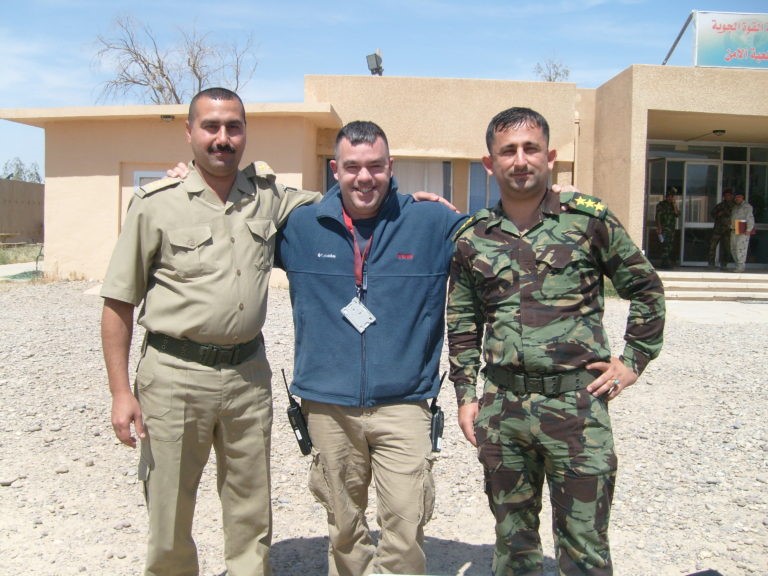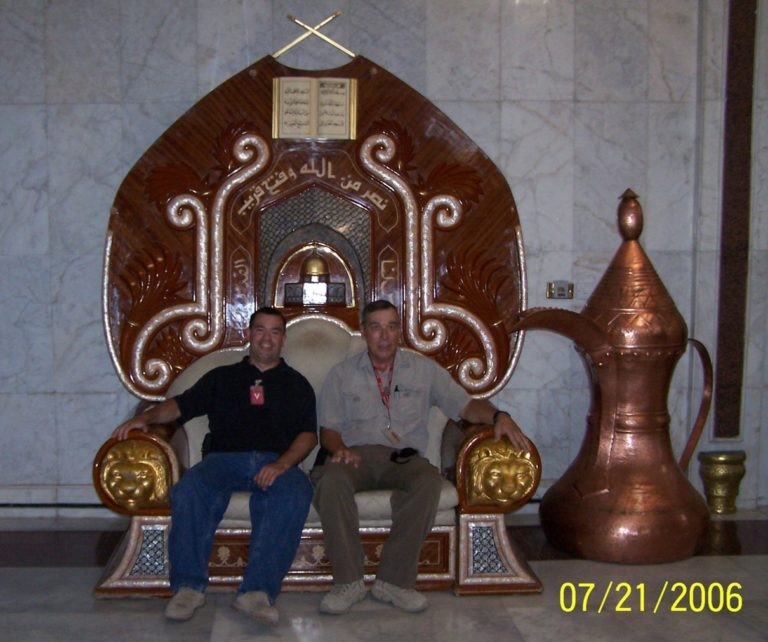
Phil Alder, center, with Iraqi Army colleagues.
Phil Alder never quits. We met at drivers ed training in East Grand Rapids, Michigan and then went to high school together at Grand Rapids Catholic Central. It quickly became apparent, whether jumping from a railroad bridge into a river, deciding on a whim to climb a mountain in Colorado, and from a few brawls, that Phil fearlessly pushes himself past any limit.
Asked about high school, he hesitates and says “I have some blank spots from getting hit”, referring to RPGs and an IED. This is true, but Phil just did not find high school remarkable. He was a good athlete, though, lettering in cross country and track. I remember the coach asking late in the season if anyone would volunteer for throwing discus. Phil did, and won the All-City meet a few weeks later.
After graduation, “I knew there would be a war, and I wanted to be part of it”. His father was a Soldier, and his great-uncles were Soldiers. He wanted to be Airborne, so “it just seemed right”. He had always been interested in aviation, and scored high on the ASVAB test. He enlisted to join an elite aviation unit.
Phil found himself at Fort Dix, New Jersey “getting yelled at continually from 0400-2000 each day” and wondered “what the hell did I just do?”. However, he learned to enjoy schools as he went from basic to helicopter mechanic training, and later to Airborne and Air Assault schools. Managing time well and pushing through sleep deprivation “made me immune to whatever punishment they could throw at me”.
Phil joined the 160th SOAR, the Special Operations Aviation Regiment, known informally as the Night Stalkers. This unit provides helicopter aviation for special operations. The Night Stalkers have a rigorous, detail-focused culture. They’re known for their “plus or minus 30 seconds” commitment to arrive at the right location, on time-often with limited visibility (night) and high speed, nap of the earth flight.
Initially, Phil joined the Green Platoon, where new members are assessed and indoctrinated. He remembers the fire ants in the Georgia grass during endless PT, and the “inverted koala”, a mild punishment where a typically junior new guy hugs a pole upside down until falling off. I don’t ask Phil why he was in the inverted koala.
Soon after arriving, Phil’s unit went to King Khalid Military City, in Saudi Arabia, for Desert Storm. His team of mechanics maintained Chinook helicopter engines, transmissions, and hydraulic assemblies.
Chemical warfare was a top concern during Desert Storm. Phil’s unit often performed their tasks in full MOPP 4, meaning a very hot chemical suit, rubber boots, and protective (gas) mask worn in the desert sun. They even performed PT in their MOPP gear. The barracks were 10 kilometers from the flight line, and Phil remembers his squad leader’s insistence on rucking (marching with a backpack), in MOPP gear to the flight line and back. Many Soldiers vomited, but Phil never doubted that he would complete a ruck.
Phil’s team handled the pressure and routine with pranks. A favorite involved juice provided by the Saudis, which used fruit fertilized with human waste. The victims were new lieutenants, who then suffered hours of sprinting to latrines but who were too junior and proud to respond.
SCUD missiles launched by the Iraqis were a constant threat. At Phil’s base, five were shot down by Patriot missiles launched by the US. At one point, a Patriot intercepted a SCUD that then dropped out of the sky to land a little over 100 meters from Phil. “It was loud as hell”. Phil’s handheld chemical detection device immediately went off. However, Phil is meticulous about equipment and noticed that the M8 chemical detection paper he kept on his suit had not changed color to indicate chemical agents.
They went next to Kuwait, which Phil remembers as scattered with stinking corpses. At the airport, they found that buildings cleared by the Marines had been re-occupied by some Iraqis. The aviators did not have infantry training, so they watched videos on close quarters battle before clearing the buildings themselves. What they found disgusted them: “You could smell them from outside”. The Iraqis had been abandoned by their units, and survived eating pigeons. The Saudi army was supposed to help. Phil remembers the Saudis as unmotivated, but quite enthusiastic about certain forms of pornography.
On returning to the US, Phil committed a cardinal sin in the precise, detail-oriented culture of 160th SOAR: he was late to a formation. “I wish it had been drinking and fighting, but I just slept in.” He “lost a stripe”, meaning he was demoted.
Phil’s determination kicked in. He won Soldier of the Month, then Soldier of the Quarter, and competed across all of SOCOM (Special Operations Command) for Soldier of the Year. Phil did not win Soldier of the Year, but made the point. He was promoted again.
The 160th deployed continually. Phil doesn’t share details. He’s not trying to be a “secret squirrel”, as Soldiers say, but it’s not good form in the service to volunteer details about some units’ deployments. Facts come out occasionally: “on our second trip to Panama [what was the first?] I realized we weren’t going to do jungle training when the flights were full of DEA agents headed to Colombia”.
Phil left active duty during the Clinton-era drawdown, when an alcohol-related incident made him vulnerable for an offense that earlier would have resulted in less of a response. He completed a degree in marketing at Grand Valley State University. He tried some sales jobs, without much interest.
When 9/11 occurred, Phil immediately joined the National Guard. When he arrived at his new unit, he went directly to the commanding officer and asked “Are we going to war?”. His unit was not slated to deploy, though.
Phil does not stop when he’s set on an objective, so he looked into contracting. He kept close records while pursuing a role with KBR, with over 250 phone calls before they agreed to hire him. He went to Iraq as truck driver. This is pure Phil: most people would dread driving MSR Tampa (Main Supply Route) with its landscape of large craters from IEDs. Phil drove a fuel truck.

Phil, left, and a friend sitting on one of Saddam Hussein’s thrones.
Phil found himself constantly alongside the Army in firefights. On an early run, an RPG bounced off his tank. It failed to explode, but the truck was leaking fuel. Phil pulled over, dollied down (detached the tank), and pulled away as the Army blew up the tank with a grenade. This happened several times. Detonating diesel fuel was less dramatic, but “if you were hauling gasoline, you can really feel the heat from the explosion at 200 meters away”.
Near Balad, Iraq, a massive IED exploded beneath Phil’s truck. The fuel tank shot into the air, then flipped to land on the cab. Phil was crushed. He broke every rib, both clavicles, and “most bones in my hands and fingers”. As he speaks, I see scars on his head and burns on his arms; it’s apparent that Phil is understating his injuries. Phil spent six weeks in a drug-induced coma, moving from Balad to the Green Zone to another facility in Iraq, and then to Landstuhl, Germany. His parents came and accompanied him on a private jet bringing Phil to Blodgett Hospital in Grand Rapids, Michigan.
Phil’s body retained fluid and became septic, causing him to swell from 195 to 275 pounds. Surgeons cut open his chest to reduce pressure. His chest cavity was open for two months. When the swelling reduced, his chest would not close. A specialist was brought in and Phil was the first patient in the US for a new technique. Eight bolts were placed in Phil’s chest, connected by Kevlar bands. Phil was laced like a shoe. Each day, the bands were drawn slightly further to close his chest. The process was excruciating. “I didn’t want to be a whimpering bitch”, he says, remembering tears streaming down his face while he remained silent.
Phil lived, of course. He immediately attempted to return to Iraq. KBR, though, had other ideas and asked Phil to learn base security. He started with perimeter security: planning, deploying, and maintaining intrusion detection systems. Phil was promoted several times. By 2015, he ran all aspects of security for 18 primary locations and numerous satellite facilities in Bulgaria, Kosovo, Romania, and Turkey. Phil excelled at investigations, and earned a reputation for solving complex cases involving KBR’s subcontractors.
This May 2016, Phil came to the Cinco de Mayo party that my wife and I put on each year. Phil and I had not seen each other in 27 years. Phil looks good; he’s back to lifting weights. He’s progressing well with PTSD, and sleeping reasonably now after many troubled years.
Phil describes an uneasy relationship with recovery. He’s very happy with the Veterans Administration, but ambivalent about anxiety medication-and what others may think it says about him. He watches me closely, trying to sense any judgmental reaction about PTSD. When he mentions a specific medication, I discuss it with him in some detail to show that people understand and accept medication.
Phil never quits. He recently decided to stop all medication-starting the day of exams to join the Michigan State Police. “I’ll still beat the young guys”, he says. Phil’s determination took him through the worst of the Iraq war and across troubled parts of Eastern Europe. Today, Phil intends to apply his security experience as a police officer, and continue to serve.
___
This story is about Phil Alder, but someone else deserves recognition. Kathy Alder, Phil’s mother, was instrumental guiding and inspiring Phil’s recovery. I remember her from high school as a strong person managing a big household full of kids. Kathy is also a nurse who closely watched Phil’s recovery. Phil’s a tough person, so it’s touching to see how close he is to his mother. I admire how she helped my friend.